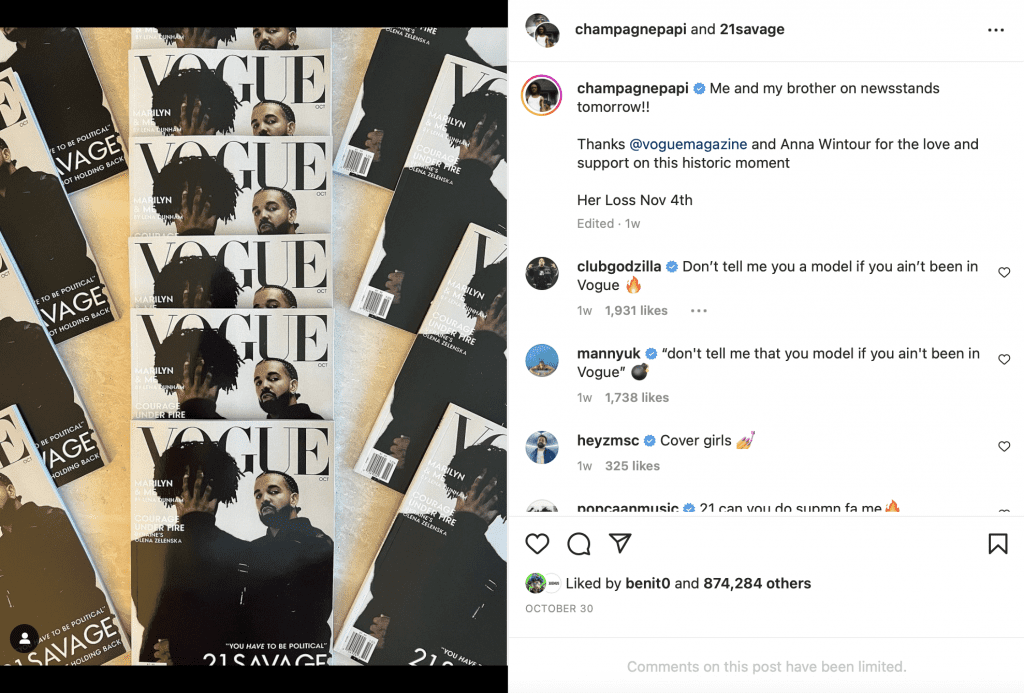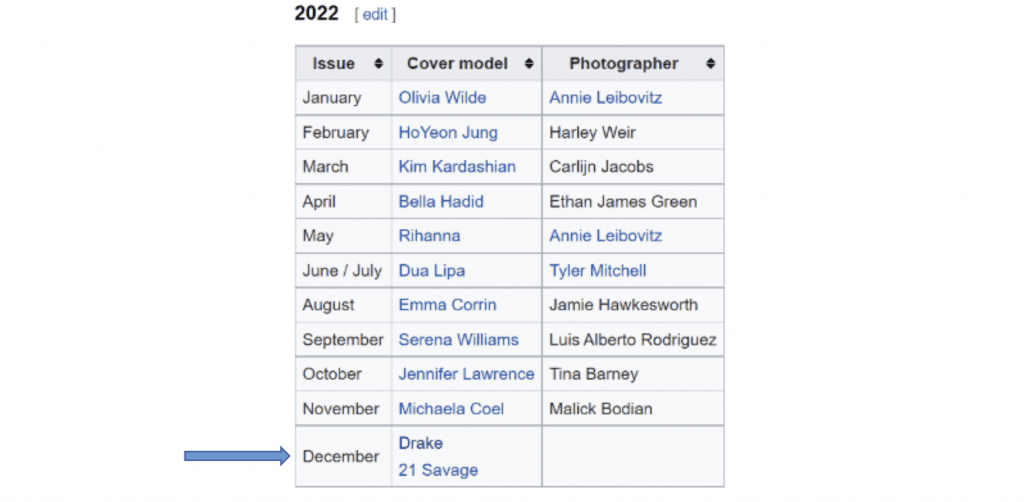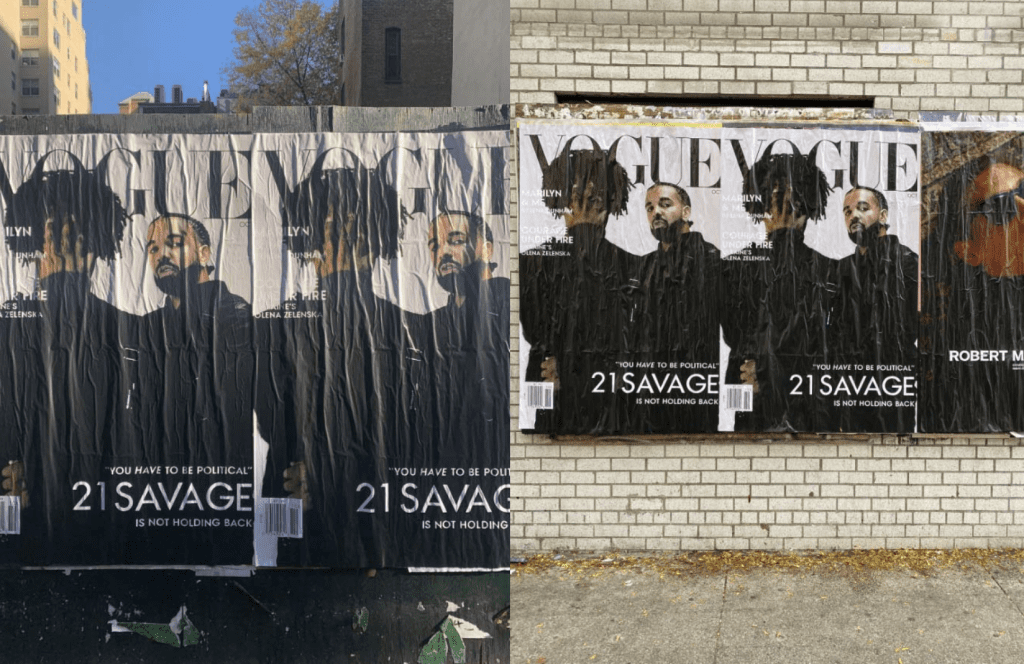Drake and 21 Savage have landed on the receiving end of a new lawsuit, but instead of facing a copyright lawsuit over song lyrics, a common cause of action in the music industry, the two rappers are being sued by Vogue’s parent company for allegedly using the magazine’s name as part of a “widespread promotional campaign.” According to the complaint that it filed in a New York federal court on Monday, Advance Publications d/b/a Condé Nast claims that Drake and 21 Savage have promoted their newly-released album Her Loss by way of a campaign “built entirely on the use of the VOGUE trademarks and the premise that Drake and 21 Savage would be featured on the cover of Vogue’s next issue.”
The problem, according to Condé Nast: “All of this is false,” and no part of the “deceptive campaign” has been authorized” by the Vogue trademark holder. New York-headquartered Condé Nast, whose media properties range from Vogue and Vanity Fair to The New Yorker and Architectural Digest, claims that Drake and 21 Savage (the “defendants”) have “gone so far as to create a counterfeit issue of Vogue magazine – distributing copies [of the magazine] in North America’s largest metropolitan areas, plastering posters of the counterfeit cover along streets and buildings throughout these cities, and disseminating images of the unauthorized counterfeit magazine to the more than 135 million social media users who actively follow [them] on social media along with an untold number of others who have viewed false social media posts.”

More than that, instead of “offer[ing] any indication that [their] supposed cover was of a counterfeit magazine,” Condé Nast asserts that the defendants’ social media posts on both Instagram and Twitter “are accompanied by the following explicitly false statements: ‘Me and my brother on newsstands tomorrow!! Thanks @voguemagazine and Anna Wintour for the love and support on this historic moment. Her Loss Nov 4th.’” Yet, in reality, the magazine publisher states that “Vogue magazine and its Editor-in-Chief Anna Wintour have had no involvement in Her Loss or its promotion, and have not endorsed it in any way, nor did Condé Nast authorize, much less support, the creation and widespread dissemination of a counterfeit issue of Vogue, or a counterfeit version of perhaps one of the most carefully curated covers in all of the publication business in service of promoting the defendants’ new album.”
(In specifically pointing out the allegedly “explicitly misleading” statements made by the defendants, Condé Nast appears to already be chipping away at any arguments that counsel for Drake and 21 Savage make in the vein of Rogers v. Grimaldi, the case in which the Second Circuit held that the unauthorized use of a trademark in an expressive work does not violate the Lanham Act unless it has “no artistic relevance to the underlying work whatsoever, or, if it has some artistic relevance, unless the title explicitly misleads as to the source or the content of the work.”)
As a result of the campaign, Condé Nast argues that confusion among the public has been “unmistakable.” In the “immediate” wake of the defendants’ deceptive social media posts, Condé asserts that “numerous media outlets” – namely, hiphop music sites – “published stories with titles like, Drake & 21 Savage Land Vogue Cover Ahead of Collab Album Her Loss; Drake and 21 Savage are Vogue’s new cover stars; and Drake & 21 Savage Make History on the Cover of Vogue.” Vogue’s owner also points to its Wikipedia page, which was updated to list Drake and 21 Savage as Vogue’s December 2022 cover stars, and similarly cites social media comments as evidence of confusion and “the widespread belief that the counterfeit issue and counterfeit cover disseminated by the defendants were real.” (For a dive into the appropriateness of social media commentary as evidence of consumer confusion, you can find that here.)

While Condé Nast claims that it attempted “resolve this matter amicably” with Drake and 21 Savage “as early as October 31” in order to “curtail further public confusion” before the release of their album on November 4, “Nothing was done, with the defendants continuing to benefit from the infringing social media posts that would take seconds to take down.” The defendants’s “flippant disregard for Condé Nast’s rights have left it with no choice but to commence this action,” Condé contends, setting out federal and state law claims of trademark infringement/ counterfeiting, false designation of origin, and false advertising, as well as violations of New York General Business Law.
With the defendants’s “misappropriation and use of the counterfeit VOGUE mark and colorable imitations thereof in connection with the advertising, sale and distribution of their goods and services” in mind, Condé Nast is seeking preliminary and permanent injunctive relief to bar the them from continuing to use “the VOGUE Mark, or any mark that is confusingly similar to, or a derivation or colorable imitation of, the VOGUE mark, for commercial purposes, including, without limitation, to advertise, market, or promote the album Her Loss,” among other things. In addition to asking the court order Drake and 21 Savage to “deliver up for destruction all physical copies of any and all … goods, labels, signs, prints, packages, wrappers, receptacles or advertisements depicting the Counterfeit Magazine and/or the Counterfeit Cover,” Condé Nast is also seeking a monetary award of the defendants’s profits from the sales of the album and the “counterfeit magazine,” or its damages, “whichever is greater;” statutory damages of up to $4 million, or “the defendants’ profits and [its] damages, increased subject to the principles of equity, in an amount to be determined at trial.”
Putting the legal issues at play aside for a moment, it is likely safe to say that from a pure PR point of view, Drake and 21 Savage (whose counsel must have foreseen the potential for legal pushback from Condé Nast) have managed to super-charge the effectiveness of their promo campaign. As of the time of publication, Condé’s lawsuit – and in turn, Drake and 21 Savage’s new album – was not only getting significantly more media attention, it was getting more attention across a broader range of outlets, than the launch of the Vogue-centric promo campaign on its own, with publications ranging from Reuters to TMZ covering the news.
The case is Advance Magazine Publishers v. Aubrey Drake Graham, et al., 1:22-cv-09517 (SDNY).














